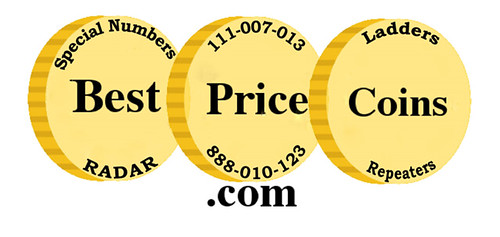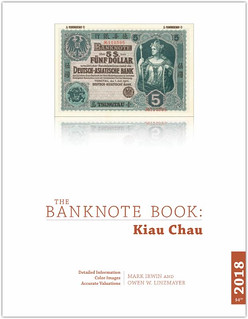
PREV ARTICLE
NEXT ARTICLE
FULL ISSUE
PREV FULL ISSUE
BANKNOTE BOOK KIAU CHAU CHAPTER PUBLISHEDOwen Linzmayer is the publisher of The Banknote Book, a useful, constantly updated electronic reference. On January 19, 2018 he announced via email the availability of the
chapter on the notes of Kiau Chau. -Editor
I'm pleased to announce the Kiau Chau chapter is now available for individual sale at US$4.99, and as a free download to subscribers.
I'd never heard of Kiau Chau and asked dr. Google for more information. I found a Wikipedia page in Spanish that Google kindly translated for me. Here's an excerpt.
-Editor
Kiau Chau was a German colonial concession that existed from 1898 to 1914. With an area of ??552 km², it is located in the imperial province of Shandong on the south coast of the Shandong peninsula in north China. Germany was relatively a newcomer to the imperialist struggle for colonies around the world. However, a German colony in China was conceived as a double undertaking: supporting the naval presence, and that the colonies (see German colonial empire ) were ideal for supporting the economy in the motherland. The densely populated areas of China were visible as a potential market. Thinkers like Max Weber demanded an active colonial government policy. In particular, the opening of China was a high priority, because it was thought to be the most important non-European market in the world. But a global policy ( Weltpolitik ) without global military influence seemed impracticable, so an Armada was built. It was assumed that this fleet should emphasize German interests in peacetime ( gunboat diplomacy ), protect German trade routes and harass enemies during the war... The article also touches on coinage of the region. -Editor
During the German occupation, the lack of silver in the whole territory forced the government of this country to use as the basis of the economy the Spanish coins of 8 reales and pesos coined in the Philippine islands . These pieces circulated by value of 5 German marks, like all the other foreign currencies of that size. In smaller pieces, 10 and 5 cents were nickel nickel dated 1909. The countermark that Chinese bankers used to allow the circulation of these coins throughout the territory was named after the enclave (Kiau Chau) in Chinese. Without this countermark the value of the pieces was 15% less than the final price, which was 5 marks. This countermark was stamped when the port was declared free in 1899 on pieces of 8 Spanish reales, 5 French francs, Maria Teresa of Austria talers and Philippine pesos. Would any of our readers have more information on the coins, or point us to where we can learn more? A Newman Portal search returns pages of results but these are mostly auction
listings and just a few short mentions in periodicals (including The Numismatist, Numismatic Scrapbook, Mehl's Numismatic Monthly, The Centinel, and the Numismatics
International Bulletin. -Editor
To read the complete article, see: For more information on The Banknote Book, see:  Wayne Homren, Editor The Numismatic Bibliomania Society is a non-profit organization promoting numismatic literature. See our web site at coinbooks.org. To submit items for publication in The E-Sylum, write to the Editor at this address: whomren@gmail.com To subscribe go to: https://my.binhost.com/lists/listinfo/esylum All Rights Reserved. NBS Home Page Contact the NBS webmaster 
|

